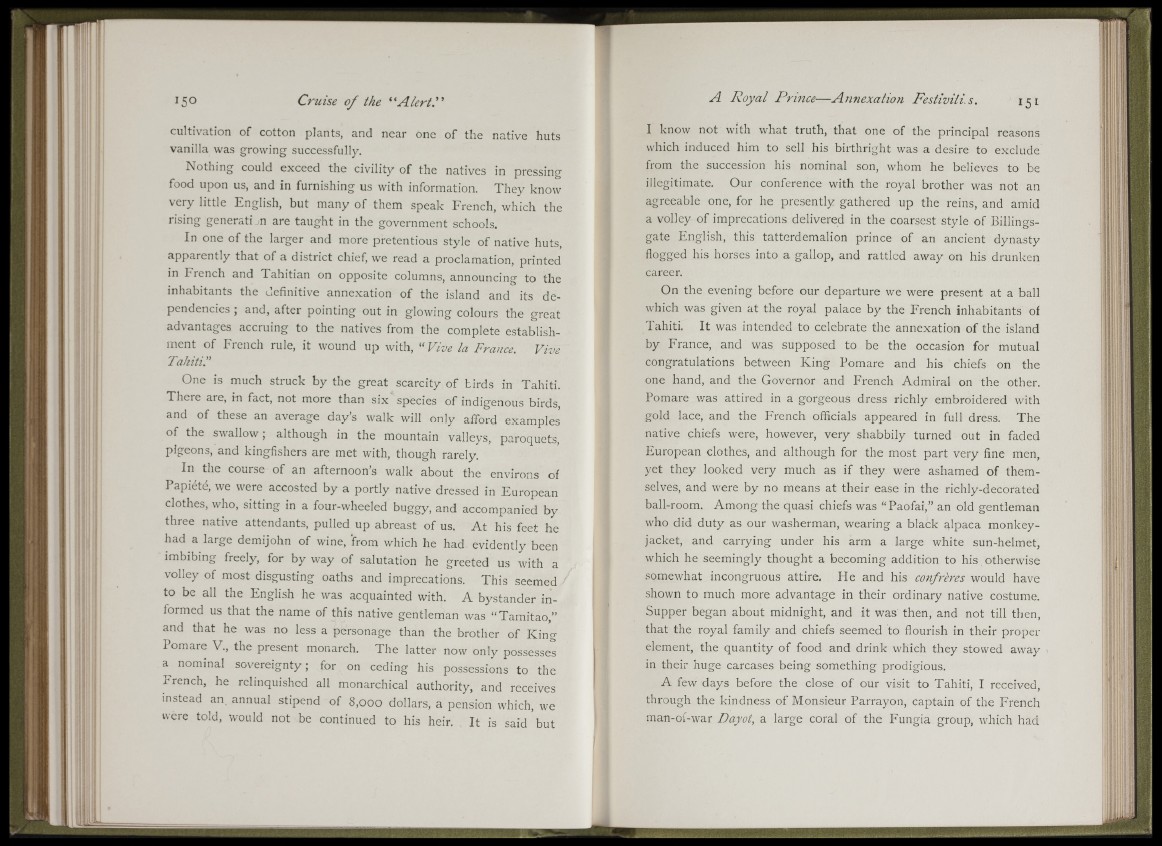
t i
w
m
!! li
lin III! '
l lU l l i : !
Üil i
i l l ' i
!I
l i!
150 Cruise 0 / the “Aiert.”
cultivation of cotton plants, and near one of the native huts
vanilla was growing successfully.
Nothing could exceed the civility of the natives in pressing
food upon us, and in furnishing us with information. They know
very little English, but many of them speak French, which the
rising generatijn are taught in the government schools.
In one of the larger and more pretentious style of native huts,
apparently that of a district chief, we read a proclamation, printed
in French and Tahitian on opposite columns, announcing to the
inhabitants the definitive annexation of the island and its dependencies
; and, after pointing out in glowing colours the great
advantages accruing to the natives from the complete establishment
of French rule, it wound up with, '‘ Vive la France Vive
rahitir
One is much struck by the great scarcity of birds in Tahiti.
There are, in fact, not more than six species of indigenous birds,
and of these an average day’s walk will only afford examples
of the swallow; although in the mountain valleys, paroquets,
pigeons, and kingfishers are met with, though rarely.
In the course of an afternoon’s walk about the environs of
Papifite, we were accosted by a portly native dressed in European
clothes, who, sitting in a four-wheeled buggy, and accompanied by
three native attendants, pulled up abreast of us. A t his feet he
had a large demijohn of wine, from which he had evidently been
imbibing freely, for by way of salutation he greeted us with a
volley of most disgusting oaths and imprecations. This seemed
to be all the English he was acquainted with. A bystander informed
us that the name of this native gentleman was “ Tamitao,”
and that he was no less a personage than the brother of King
Pomare V., the present monarch. The latter now only possesses
nominal sovereignty; for on ceding his possessions to the
Prench, he relinquished all monarchical authority, and receives
instead an, annual stipend of 8,000 dollars, a pension which, we
were told, would not be continued to his heir. It is said’ but
A Royai Prince— Annexation Festiviti.s.
I know not with what truth, that one of the principal reasons
which induced him to sell his birthright was a desire to exclude
from the succession his nominal son, whom he believes to be
illegitimate. Our conference with the royal brother was not an
agreeable one, for he presently gathered up the reins, and amid
a volley of imprecations delivered in the coarsest style of Billingsgate
English, this tatterdemalion prince of an ancient dynasty
flogged his horses into a gallop, and rattled away on his drunken
career.
On the evening before our departure we were present at a ball
which was given at the royal palace by the French inhabitants of
Tahiti. It was intended to celebrate the annexation of the island
by France, and was supposed to be the occasion for mutual
congratulations between King Pomare and his chiefs on the
one hand, and the Governor and French Admiral on the other.
Pomare v/as attired in a gorgeous dress richly embroidered with
gold lace, and the French officials appeared in full dress. The
native chiefs were, however, very shabbily turned out in faded
European clothes, and although for the most part very fine men,
yet they looked very much as if they were ashamed of themselves,
and were by no means at their ease in the richly-decorated
ball-room. Among the quasi chiefs was “ Paofai,” an old gentleman
who did duty as our washerman, wearing a black alpaca monkey-
jacket, and carrying under his arm a large white sun-helmet,
which he seemingly thought a becoming addition to his otherwise
somewhat incongruous attire. He and his confrères would have
shown to much more advantage in their ordinary native costume.
Supper began about midnight, and it was then, and not till then,
that the royal family and chiefs seemed to fiourish in their proper
element, the quantity of food and drink which they stowed away
in their huge carcases being something prodigious.
A few days before the close of our visit to Tahiti, I received,
through the kindness of Monsieur Parrayon, captain of the French
man-of-war Dayot, a large coral of the Fungia group, which had
u f i ih pü4>ii